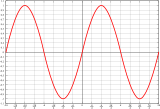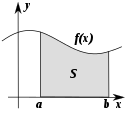Mathematics
Mathematics is the study of numbers, shapes, and patterns. The word comes from the Greek μάθημα (máthema), meaning "science, knowledge, or learning", and is sometimes shortened to math or maths.

It is the study of:
- Numbers: including how things can be counted.
- Structure: including how things are organized, but also how they can be or could have been. This subfield is usually called algebra.
- Place: where things are, and spatial arrangement, including arrangements of spaces themselves. This subfield is usually called geometry.
- Change: how things become different. This subfield is usually called analysis.
Applied math is useful for solving problems in the real world. People working in business, science, engineering, and construction use mathematics.[1][2]
Problem-solving in mathematics
Mathematics solves problems by using logic. One of the main tools of logic used by mathematicians is deduction. Deduction is a special way of thinking to discover and prove new truths using old truths. To a mathematician, the reason something is true (called a proof) is just as important as the fact that it is true, and this reason is often found using deduction. Using deduction is what makes mathematical thinking different from other kinds of scientific thinking, which might rely on experiments or on interviews.[3]
Logic and reasoning are used by mathematicians to create general rules, which are an important part of mathematics. These rules leave out information that is not important so that a single rule can cover many situations. By finding general rules, mathematics solves many problems at the same time as these rules can be used on other problems.[4] These rules can be called theorems (if they have been proven) or conjectures (if it is not known if they are true yet).[5] Most mathematicians use non-logical and creative reasoning in order to find a logical proof.[6]
Sometimes, mathematics finds and studies rules or ideas that we don't understand yet. Often in mathematics, ideas and rules are chosen because they are considered simple or neat. On the other hand, sometimes these ideas and rules are found in the real world after they are studied in mathematics; this has happened many times in the past. In general, studying the rules and ideas of mathematics can help us understand the world better. Some examples of math problems are addition, subtraction, multiplication, division, calculus, fractions and decimals. Algebra problems are solved by evaluating certain variables. A calculator answers every math problem in the four basic arithmetic operations.
Areas of study in mathematics
Number
- Mathematics includes the study of numbers and quantities. It is a branch of science that deals with the logic of shape, quantity, and arrangement. Most of the areas listed below are studied in many different fields of mathematics, including set theory and mathematical logic. The study of number theory usually focuses more on the structure and behavior of the integers rather than on the actual foundations of numbers themselves, and so is not listed in this given subsection.
Natural numbers Integers Rational numbers Real numbers Complex numbers Ordinal numbers Cardinal numbers Arithmetic operations Arithmetic relations Functions, see also special functions
Structure
- Structural mathematics studies objects' and constructions' shape and integrity. These are areas of algebra and calculus.
Shape
- Some areas of mathematics study the shapes of things or matter. Most of these areas are part of the study of geometry.
Change
- Some areas of mathematics study the way things change. Most of these areas are part of the study of analysis.
Applied mathematics
- Applied math uses symbolic logic to solve problems in areas like engineering and physics.
Famous theorems
These theorems and conjectures have interested mathematicians and amateurs alike:
- Pythagorean theorem – FLT – Goldbach's conjecture – Twin Prime Conjecture – Gödel's incompleteness theorems – Poincaré conjecture – Cantor's diagonal argument – Four color theorem – Zorn's lemma – Euler's Identity – Church-Turing thesis
These theorems and hypotheses have exceedingly changed mathematics:
- Central limit theorem classification theorems of surfaces – Continuum hypothesis – Fourier Theorem – Fundamental theorem of calculus – Fundamental theorem of algebra – Fundamental theorem of arithmetic – Fundamental theorem of projective geometry – Gauss-Bonnet theorem - Kantorovich theorem – P Versus NP – Pythagorean theorem – Riemann hypothesis
These are a few conjectures that have been called "revolutionary":
- Beal Conjecture (a generalization of FLT) – Birch and Swinnerton-Dyer Conjecture – Collatz Conjecture – Goldbach's Conjecture –Hodge Conjecture – Poincaré Conjecture
Foundations and methods
- Set theory – Symbolic logic – Model theory – Category theory – Logic – Table of mathematical symbols
History and the world of mathematicians
- History of mathematics – Timeline of mathematics – Mathematicians – Fields Medal – Abel Prize – Millennium Prize Problems (Clay Math Prize) – International Mathematical Union – Mathematics competitions – Lateral thinking – Mathematics and gender
Awards in mathematics
There is no Nobel Prize in mathematics. Mathematicians can receive the Abel Prize and the Fields Medal for important works.[7][8]
The Clay Mathematics Institute has said it will give one million dollars to anyone who solves one of the Millennium Prize Problems.
Mathematical tools
There are many tools used to do math or find answers to math problems.
- Older tools
- Abacus
- Napier's bones, Slide rule
- Ruler and Compass
- Mental calculation
- Writing
- Newer tools
- Graphing calculators, scientific calculators and more complex computer visual tools
- Programming languages
- Computer algebra systems (listing) and automated matrix analysis
- statistics software (for example SPSS)
- SAS (programming language)
- R (programming language)
References
Related pages
- Timeline of women in mathematics
- American Mathematical Society
- Society for Industrial and Applied Mathematics
- International Congress on Industrial and Applied Mathematics
- International Congress of Mathematicians
- International Mathematical Olympiad
- Mathematics Genealogy Project
- Mathematics Subject Classification
Other websites


- Mathematics Citizendium
- Mathematics at the Open Directory Project

























